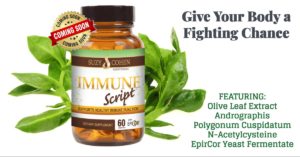What's On This Page?
ToggleAt this time of year, we need to protect ourselves from all kinds of bugs that can cause fever and flu symptoms and make us uncomfortable, and this is especially important for people who are older, or have a compromised immune system.
 The symptoms are similar from bug to bug, however, the severity differs from person to person. As you know, you may experience any or all of the following:
The symptoms are similar from bug to bug, however, the severity differs from person to person. As you know, you may experience any or all of the following:
Sore throat
Cough
Fever and chills
Runny nose
Stuffy nose
Body aches
Fatigue
Headache
Sinus pressure or pain
Loss of taste or smell
Today’s article is to help bring understanding to herbs and essential oils that may ease your discomfort. I also need to make sure you understand that anything you read here today should not (and does not) replace the need for proper medical attention if your symptoms are severe. Here are some of the easiest, most accessible things you can do or get in case you are feeling under the weather during this winter season.
8 Powerful Ideas for Solving Cold, Flu and Fever
Echinacea
This is an ancient plant that has many medicinal actions, and I keep it in my home as a dried herb so that I can make a tea out of it during the fall and winter. It’s better for prevention than treatment.
Astragalus
I use the bark and put two or three strips in my soups and broths when cooking, and I do this all year long. There are also supplements available. This is an herbal remedy that can strengthen the immune system, and just like echinacea, I’d say this one is somewhat better at preventing problems than it is treating them.
Of course, the FDA requires me to tell you to ask your doctor what’s right for you, and also to keep in mind that only pharmaceutics can “treat a disease,” and that herbs and vitamins are useful to support the health of something, like an organ. So in this case, I can tell you that astragalus supports an already healthy immune system.*
 Acetaminophen
Acetaminophen
This is a medication you can buy over-the-counter (OTC) and it reduces fever. It is somewhat better as an anti-pyretic than its cousin ibuprofen, however, both could work. Fever is your body’s attempt to cook the bugs that have infected you, so do not rush to treat it.
Fevers should however, be treated when they reach 102 degrees Fahrenheit or 39 degrees Celsius. There are some herbal choices for those of you interested and these include elderflower (which is not the same as elderberry), catnip (which is a gentle choice for toddlers), white willow bark or lemon balm. I have some of these in my herbal apothecary in my kitchen, just in case of fever. These are okay to combine with the acetaminophen.
Probiotics
These can be taken throughout the year to support digestion, and immunity. High-quality probiotics will improve the flora fingerprint that you yourself have, and this triggers the production of more Interleukin 10 (IL-10) and in short, this reduces inflammation.
Eucalyptus Essential Oil
If you were to rummage in my purse on any given day int he winter, you’d find my little bottle of eucalyptus essential oil. I also take it with me during travel so I can take a quick whiff in hotels or dab it in my mask which I wear on the planes. Eucalyptus is a strong anti-viral and it opens up breathing passageways.
This makes the herb particularly helpful because it works like a natural decongestant or cough suppressant. I recall once getting very sick and putting a few drops into a pot of hot water and then doing a steam inhalation. It helps the body break down mucus and phlegm. You can also diffuse this in your home or office aromatizer. If the scent is too strong, tone it down with orange, lavender or rosemary.
Epsom Salts or Magnesium
Epsom salts get their name from the town they were discovered in, Epsom in Surrey, England which is thirteen miles south of London. Epsom salts are a completely different animal than table salt! These salts are made up of magnesium and sulfate and dissolve in your bath water.
The magnesium is super relaxing to muscles and can relieve tension and body aches through the transdermal absorption. Soak in a nice, warm bath for 15 minutes and then dry off. If baths are not your thing, magnesium supplementation can be helpful. The easy-on-the-tummy forms of magnesium are the chelated ones, as opposed to cheaper alternatives like magnesium oxide and others.
If you would like to read more about the health benefits of epsom salts Click Here
Castor Oil
There’s a folk remedy with castor oil that may help improve your sense of smell. No one is really sure if it work, or how well but it has to do with the active ingredient “ricinoleic acid” which reduces nasal inflammation. Warm up a small amount and rub 2 drops in each nostril twice daily.
A neti pot and saline irrigation or saline nasal sprays may soothe the nasal passages and promote faster recovery by flushing out allergens, irritants and mucus from the nasal cavity.
 Lemon Water
Lemon Water
Water is so underrated by many people but it’s imperative to drink when you are sick! Drinking pure, filtered water helps move lymph and it rehydrates your cells. If you’re feverish, or you have a sore throat, maybe an ice water with a sprite of freshly squeezed lemon juice in it sounds refreshing. Alternatively, make a cup of warm water with a space of lemon and some honey in it.
FYI, honey is not generally given to babies. Before I leave the topic of lemon and lemon juice – it’s superfood and I just created a delicious recipe for Lemon Dill Sauce that I want to share with you. https://suzycohen.com/articles/lemon-dill-sauce-for-pasta/
Herbal Teas
There are commercially prepared ginger tea bags, or you can use 1/4 TEA of pure ginger spice to 1 cup of water. The ginger herb is perfect in my opinion because it is one, a natural blood thinner that can effectively help with clot breakdown and platelet activity, and two, it tamps down inflammation of the nasal passageway, which is useful for your sense of smell.
You can get my make a ginger smoothie HERE. If you are interested in a powerful immune-boosting herbs that you can turn into tea, CLICK HERE to get the easy recipe and list of herbs for How to Make an Herbal Immune Tea.
But don’t stress if you do not have ginger, and certainly don’t go out to get ginger if you’re already sick because you risk infecting others at the store. Just steep any tea bag from the following that you have in your home such as jasmine, licorice, chamomile, peppermint, Pu’er tea, green tea, rooibos or chai. All of those are different, but each of them have important medicinal actions on the body. Here’s another article to help you, it’s entitled, How to Make Herbal Teas for Your Troubles.
There are medicinal mushroom teabags that support immunity that are widely available at health food stores, online and at most supermarkets. Whatever you decide, keep the water with lemon flowing!
A word about vitamins… A lot of people wonder if vitamin D, zinc and C are useful. There is a lot of misinformation out there, and people who shouldn’t be talking are sharing all kinds of problematic information that could be detrimental to your health.
It’s impossible to know what’s right for each and everyone so I will answer it as a blanket statement. I think all three of those have potential uses, and could be supportive to the human body. What I don’t like to see is the misuse of these supplements.
For example overdoing it and taking too high of a dosage of vitamin D could create other problems because that could lead to hypercalcemia, and impact your heart rhythm. So people who are taking gigantic doses of D really do need to be careful. It doesn’t necessarily prevent you from getting infected either. Other nutrients matter too. I’m just being sensible.
Sometimes food is better too, for example, drinking a glass of orange juice (or lemon zest in your tea, see above!) is preferable to taking a synthetic supplement. The citrus juice doesn’t provide as much C as a supplement, but if your diet permits the orange juice, and your throat can tolerate it, you’ll do better with that than synthetic “ascorbic acid.” Another point about C, and I love C I’m not downing it, I just need to tell you that it could raise risk for kidney stones if you overdo it.
These are just my opinions, so YES I do believe in natural versions of nutrients – the body runs on these! But be smart, don’t overdo it, don’t take anything unless you are deficient in it, and be very careful especially with zinc.
Zinc is another good nutrient if you’re deficient in it because it ramps up immune function, but there are studies to suggest that the flu bugs love zinc, and it may fuel symptoms in some people exacerbating their infection. Zinc, while helpful to most people, should not be considered a wet blanket for every single type of pathogen that infects the human body.
Cysteine
L-Cysteine is an amino acid that goes on to form glutathione in the body which is a powerful antioxidant. We know that this compound can help with pulmonary function and mucus clearance. It goes by other names too, sometimes it’s “acetylated” and it is available at health food stores and Amazon for now. A closely related compound was recently banned on Amazon but is still available from certain sellers.
Garlic
It’s probably the last thing you’re craving when you feel miserable and your laid up in bed! But garlic has strong antiviral, antibiotic properties so if you can bring yourself to eat it in your chicken soup, or eggs or anything, please do. There are supplements available too, and they are odorless so you can consider that as well. I also have a recipe that I’d love to share which is my Brilliant Chimichurri Sauce, and it has a lot of parsley, garlic and other herbs that help a person who doesn’t feel well.
If someone could make this for you, it would be great on something soft (I’m imagining your throat hurts), so like eggs, mashed potatoes, a baked potato, in your soup, or whatever else you could eat during your illness. Check out the recipe HERE.
In closing, there are many natural options to help yourself get through a few days of feeling sick. It’s obviously better not to catch antigen in the first place, so when you’re out practice good hygiene. This is common sense, I shouldn’t need to say these things but even yesterday when I was out, I watched someone sneeze 7 times in the baking aisle when I was looking for some bread flour.
He didn’t cover his mouth once! So as a reminder, don’t go out if you’re sick, cover your mouth when you sneeze, try not to touch your nose or mouth too often, use sanitizer during cold and flu season, and obviously wash your hands frequently.
If you’ve received a vaccine, and have minor side effects, here’s an ARTICLE to help treat yourself.
If you’re not sure whether Tylenol or Advil is right for you, here’s another ARTICLE to help you make an informed decision.
If you’ve heard bad things about Elderberry, let me put all that to rest in this informative ARTICLE.
If you’ve been in a crowd like gone to a football game or to the mall, why not launder all your clothing before wearing them again? Remove your shoes at the door. Simple things like that go a long way in reducing risk.
Whatever you do, don’t blow your nose or cough into your hands, and then shake someone else’s hand. It’s inconsiderate, we’d all rather just say hello or fist bump! It’s the little things but they are very important in terms of reducing spread of illness. Please share my blog in case it helps someone else you know.
For your overall immune health, check out my formula IMMUNE SCRIPT.

Suzy Cohen, has been a licensed pharmacist for over 30 years and believes the best approach to chronic illness is a combination of natural medicine and conventional. She founded her own dietary supplement company specializing in custom-formulas, some of which have patents. With a special focus on functional medicine, thyroid health and drug nutrient depletion, Suzy is the author of several related books including Thyroid Healthy, Drug Muggers, Diabetes Without Drugs, and a nationally syndicated column.

